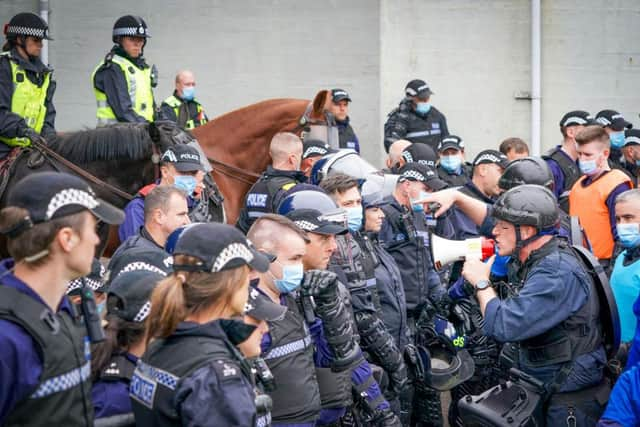Good COP26, bad COP26: How protests at the UN climate talks will be policed
Senior officers have stressed that the tone of policing during the two-week summit will be “friendly, fair and accommodating” but said they will act “swiftly and robustly” against demonstrators who are violent or cause damage.
Deputy Chief Constable Will Kerr said: “People at protests sometimes break the law in a number of ways that aren’t linked to violence or disorder, such as blocking roads.
“Some disruption is inevitable during the event.


Advertisement
Hide AdAdvertisement
Hide Ad“If someone is causing significant disruption by wilfully obstructing a main traffic route then officers may move through the various stages of our graduated response more quickly than they would during instances which are causing minimum disruption.”
Around 10,000 officers will be deployed each day, with Scotland’s forces being bolstered by police from other parts of the UK.
Firearms officers, mounted branch, dog handlers, search teams and the marine unit will all be used in what is set to be the largest policing operation ever undertaken in Scotland.
Police Scotland said teams from other parts of the UK would “receive detailed briefings on the style and tone of policing ahead of being deployed”.
Up to 30,000 world leaders and delegates are due to head to Glasgow for the United Nations conference, which is being staged at the Scottish Events Campus, overlooking the River Clyde.
Many thousands more are also expected, including visitors, media and activists.
Major demonstrations are being planned to coincide with the talks, which are seen as crucial in the global mission to halt runaway climate change.
Among them is the Global Day of Action for Climate Justice, organised by the UK-based COP26 Coalition, which will see up to 100,000 people marching through the streets of Glasgow on November 6 to demand support for people and communities unfairly impacted by environmental breakdown.
Advertisement
Hide AdAdvertisement
Hide AdDCC Kerr highlighted the force’s duty under the European Convention on Human Rights to protect both demonstrators and the wider community.
He said: “We will provide a proportionate policing response to any protests and have been engaging with known protest groups for some time to ensure their rights to peaceful assembly and protest are met.
“Those wishing to protest have a responsibility to do so within the law and I would remind the small minority of people who may be intent on violent disorder or causing damage that we will deal with them swiftly and robustly.
“The policing of protests is a particularly difficult balancing act when they are non-violent and peaceful but highly disruptive or unlawful.”
The announcement comes after a string of actions in England by campaign group Insulate Britain, which wants the government to insulate all UK homes by 2030 to cut greenhouse gas emissions.
Key roads, including the M25, have been targeted on 14 days over the past five weeks, with activists often gluing their hands to the carriageway to increase the length of time it takes for police to remove them.
Hundreds of arrests have been made, with some people detained several times.
Angry drivers have also often confronted the protesters and attempted to drag them away.
Advertisement
Hide AdAdvertisement
Hide AdThe DCC insisted that Police Scotland was “ready and well prepared” to deliver the COP26 operation, which will involve one of the biggest ever mobilisations of police to take place in the UK.
He added: “With around 120 world leaders and heads of state attending, along with thousands of delegates and those who wish to protest, the scale of the security operation cannot be overstated.
“It is a huge challenge but one we are ready to deal with.
“Police Scotland has an enviable reputation throughout the world for the policing of major events and I am confident that we will once again deliver a response which helps deliver a safe and secure conference.”
But action groups have warned that lessons must be learned from previous demonstrations that have turned ugly.
Nick Bryer, head of European campaigns for 350.org, said: "It is essential that the right to assemble and to protest is preserved around the UN climate talks.
“People from across the world, from communities directly impacted by the climate crisis, will be in attendance and protest is an essential way for their voices to be heard and their futures to be secured.
“At previous UN climate talks, and at other recent protests in the UK, we have repeatedly seen the police unnecessarily and quickly escalate to violence, often acting on arbitrary measures of what constitutes a ‘legitimate’ protest.
“With reports of Scottish police receiving mass riot training in preparation for the talks in Glasgow, it is vital the police are held to account and this violence is not repeated."
Advertisement
Hide AdAdvertisement
Hide AdNearly 500 arrests were made in London during two weeks of demonstrations by climate activists from Extinction Rebellion in August and September.Police were accused of heavy-handed tactics after officers could be seen using batons and dragging protesters from the top of a bus during one demonstration.
In Scotland an estimated 700 people were arrested, with 350 charged, in connection with protests during the 2005 G8 summit that resulted in injuries to scores of police and activists after clashes turned violent.
Police Scotland also gave assurances that contingencies were in place to deal with additional pressures on services during COP26, and the public would receive an emergency response if needed.
